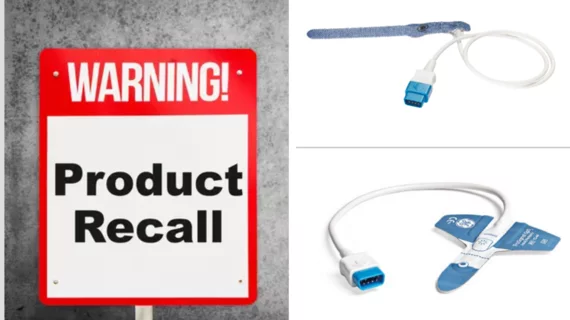The U.S. Food and Drug Administration (FDA) has announced that GE Healthcare is recalling more than 7,000 TruSignal SpO2 sensors due to issues with the devices malfunctioning and sending a reduced amount of energy to the heart during defibrillation. The FDA has categorized this as a Class I recall, which means the use of these devices “may cause serious injuries or death.”
“This issue is most hazardous to hospitalized patients who may need defibrillation for cardiac arrest,” according to an advisory on the FDA’s website. “Affected sensors may also unintentionally expose patients to electrical currents from other sources or may provide inaccurate measurements of SpO2, which can impact treatment decisions.”
The TruSignal SpO2 sensors are used for continuously monitoring the amount of oxygen found in blood flowing through a patient’s arteries and pulse rate. Specific product names in the recall include the TruSignal Adult/Pediatric Sensor, TruSignal AllFit Sensor, TruSignal Sensitive Skin Sensor, TruSignal Wrap Sensor, TruSignal Ear Sensor, TruSignal Integrated Ear Sensor with GE Connector, TruSignal Integrated Ear Sensor with Datex Connector, TruSignal Integrated Ear Sensor with Datex Connector and TruSignal Integrated Ear Sensor with Ohmeda Connector.
A total of 7,559 devices are included in the recall. All devices were distributed to customers from January 2021 to March 2023.
No patient injuries or deaths have been linked to this issue. (Note: The original FDA advisory said four patient injuries had been associated with the issue.)
GE Healthcare’s recommendations for customers impacted by the TruSignal sensor recall
"Patient safety is our top priority," GE Healthcare said in a statement to the media. "We are informing customers of the potential issue and providing them with interim instructions until the affected products are replaced."
The company sent an Urgent Medical Device Correction notice to all customers impacted by this recall on May 19. It recommends the use of an alternative method for all SpO2 monitoring, including any TruSignal sensors not included in the recall.
“If alternate methods are not available, use affected TruSignal SpO2 sensors as long as they have not been saturated with fluids,” according to GE Healthcare. If defibrillation is necessary when using those sensors, customers should remove the sensor and then “defibrillate per hospital protocol.”
The company also said that customers still using these devices should “confirm the adult/pediatric SpO2 sensors do not have material covering the emitter or detector before using” and “discard the sensor and use another sensor if any additional material is found to be present.”
GE Healthcare also urged customers to make sure anyone who may use these devices is aware of the recall and reads all recommendations.

